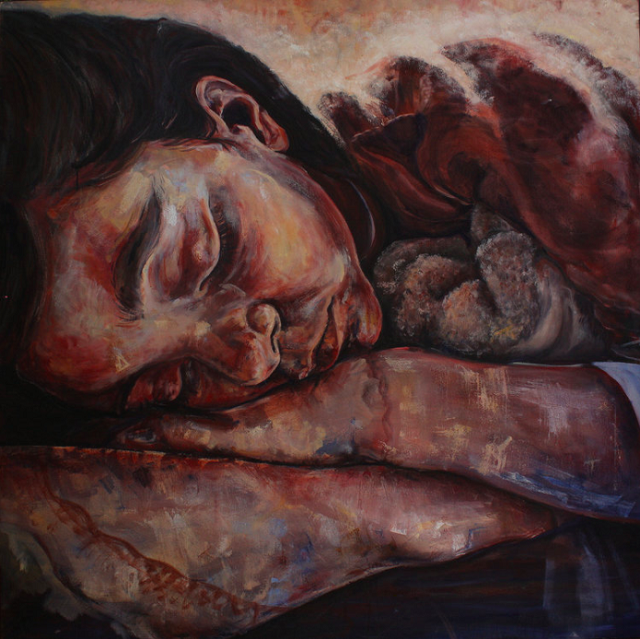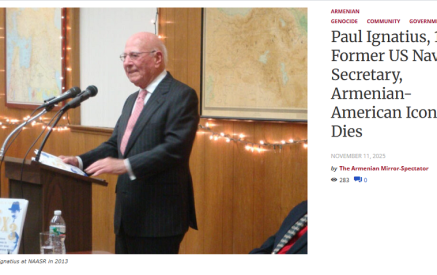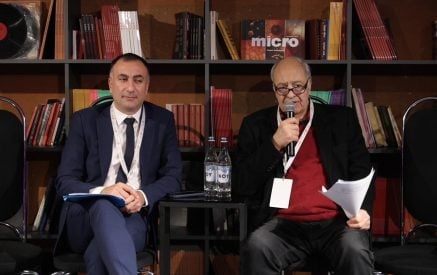“Enough of burdens, enough of woes,
weighing down our shoulders, enough of those
salty tears that dim our eyes.
Enough of weeping; enough of sighs.
Enough of old wooden rules and laws
sacrificing our youthful days,
keeping us behind four walls.
Enough of doors slammed in our face…
Let us awake and rouse the world…
for our just place and cause
let us go forward. Let us unite for the sake of freedom’s sacred light.
We are all equal and equal to the fight.”
Read also
“Let us Unite” by Shoushanig Gourghinian
Translated by Diana Der-Hovanessian, “The Other Voice: Armenian Women’s Poetry Through the Ages”
In the face of unspeakable violence, flagrant discrimination and outright hatred, the Armenian community – both within Armenia and the diaspora – has remained fiercely resilient. We are a strong people. We cherish our rich culture. We are passionate about supporting our homeland, and we share an immense pride for our country and for simply being Armenian.
But such a turbulent, violent history does not come without consequences. This history has inevitably left scars on our community, and some scars have yet to heal. Generations of Armenians have experienced not only genocide, but they have been repeatedly forced to become refugees. Thus, they experienced war, poverty and conflict in the areas to which they fled. Such events would be traumatizing for any community. The mental distress experienced by each of our generations, dating back to the Genocide, has been undeniably passed down to us.
Nonetheless, we have, thus far, failed as a community to effectively address the physical and mental anguish that Armenian youth currently face. Traditional, conservative ideals and morals have stood in the way of many Armenians seeking mental health treatment. We have been irrevocably infected by stigma toward mental health and wellness, a subject I recently addressed for the online platform Kooyrigs.
Sadly, our community has often identified mental health disorders as signs of weakness. Patients are referred to as crazy or “khent.” Some among us believe that these patients are defective and burdensome. In tandem with these damaging attitudes, discussions about treatment – let alone diagnoses – are seen as shameful, or “amot.” Mental health and wellness are often seen as clandestine, private family matters that if openly discussed would humiliate both the family and its reputation. Unfortunately, there is even a portion of radically conservative Armenians who simply argue that mental health illnesses do not exist. These individuals engage in a blatant, ignorant denial of the truth of the matter. Oftentimes they believe that the individual is in complete control of their behavior. These beliefs are discriminatory. They unjustly identify those who struggle with their mental health as less than as opposed to courageous and resilient.
Under these conditions, Armenians have been historically deprived of opportunities to seek professional treatment. The aforementioned toxic beliefs instill shame in Armenians, encouraging them to conceal the state of their mental health. The idea that mental health is a private family matter – never to be openly discussed in fear of shame – has stripped us of invaluable, accurate assessments of our family medical histories.
In the aftermath of the community’s shortcomings in Armenia, individuals who have mental disorders live in poor conditions, with little to no access to satisfactory healthcare solutions. They live under archaic, outdated laws and legislation that do not address or prioritize a systemic program to improve mental wellness. Thus, the most commonly used form of intervention is inpatient care. Oftentimes, inpatient care is used as a threat to individuals who argue, act emotionally or defend themselves. In 2018, the Human Rights Defender of Armenia created a report on the rights of patients in psychiatric hospitals, suggesting these fears are not without basis. The report found that conditions in Armenia’s psychiatric hospitals were poor and that the human rights of patients were frequently violated. It’s clear to me that the homeland is suffering from insufficient resources to treat mental health disorders.
The story of Julietta Amarikian exemplifies such human rights violations. In October of 2015, Julietta and her brother had a serious disagreement over a flat they had inherited from their parents. While Julietta wanted to sell the house and share the proceeds with her brother, he insisted that she move out, so that he may live there with his wife. As the argument intensified, Julietta’s brother told her that he would have her committed to an institution should she continue to disagree. Days later, doctors and policemen forcefully took her to a mental health clinic without her consent. She was locked up for one month without any form of examination. Julietta did not suffer from a mental health disorder, she simply had a disagreement with her brother. But the suffering she faced in an Armenian psychiatric hospital demonstrates the consistent violation of human rights in inpatient mental institutions within Armenia.
In the aftermath of the community’s shortcomings in the diaspora, the conditions are not so severe. However, there are limited discussions of mental health disorders as a whole. Instead, many of us wear meticulously crafted masks to give the illusion that all is well. Sometimes, we create excuses as to why we’re not at family events instead of being transparent about the troubles we’re experiencing behind closed doors. This can be identified as the “hush hush” demeanor. We pray for help, we yearn for understanding, but we are often incapable of being honest with ourselves and others. Stigma stands in our way. We are so ashamed and fearful of outside judgment that we place our mental health and wellness on the back burner. Moreover, there is a general lack of mental health and wellness resources catered specifically to the Armenian community. Though there exist a myriad of resources and treatment options catered to non-Armenians, our community lacks the luxury of such accommodations.
A question that arises now is, “Are we equipped as a community to handle the process of de-stigmatization? Or are these preconceived notions too entrenched in our community?”
I believe that these questions do not matter. Whether or not we are ready to destigmatize, we must. It is time for us to face these discriminatory behaviors head on by building a toolbox of resources that will slowly break them down. It is time for us to unite against these pernicious, harmful beliefs. Pre-formed, stigmatic behaviors are significantly affecting the health and wellbeing of our community. Most individuals know at least one person who has struggled with their mental health, perhaps even themselves. Any family would experience heartbreak when their loved ones suffer.
For most non-Armenian families, it’s a bit easier to get help from friends, family, therapists. This is not a statement written lightly. Absolutely no individual should have their struggles undermined. But in our community, reaching out has been digested and identified as a seriously negative action that would stain the family’s reputation. Such an identification has created serious obstacles and has encouraged hiding, not only from our immediate friends and family, but especially from our older, more traditional relatives. However, regardless of how deeply these misconceptions have been absorbed amongst our community, we must act now. We are obligated to do so. Continuing this toxic behavior will rob our future generations from proper treatment for mental health. The precedent that we set for new generations of Armenians will significantly shape their lives.
There are many ways we can provide a healthy example for our descendants to follow. One example addresses discussions, which are absolutely crucial for our community. We must open up conversations about mental health. We must all arrive at the conclusion that no individual is less than because they have a disorder, and this must begin with discussion and dialogue. We must believe that these interactions and conversations are not embarrassing, they are essential. Such discussions propel us forward in the direction of change. We must take these conversations and use them as teaching moments for our elders or our peers.
Subsequently, we must build upon these discussions to create tangible change. Nothing will change in reality if we do not follow up the dialogue. This is where the real work begins. Each of our communities must identify the most pressing needs concerning mental health and act upon those needs. For example, in Armenia a systemic change is needed to properly address the mental anguish that Armenian citizens face, and such a change requires creating and passing new legislation. It also requires a full remodeling of psychiatric institutions, a remodeling that would require each individual institution to examine patients, treat them with dignity, and most importantly, do no harm. In the diaspora, a reckoning needs to take place. Diasporan Armenians must seek facts and resources about mental health, learn about stigmatizing language and become transparent with one another. Diasporan Armenians should, if possible, talk to their parents and grandparents about their experience with mental health. However vague, this would give us some valuable information about our family medical history. Diasporan Armenians should not engage in hostile behavior toward patients.
I believe Armenians must understand that individuals with mental health disorders are not a blemish upon our history. They actually play a crucial part in what makes us so strong. Along with trauma, our resilience, our determination and our will to get better have also been passed down through the generations. Let us all unite to support our fellow Armenians. Let us unite to destigmatize Hyes.
Alexa Gris
Caption: Painting by Weekly designer and artist Masha Keryan. “Silent,” oil on canvas, 2015





























































